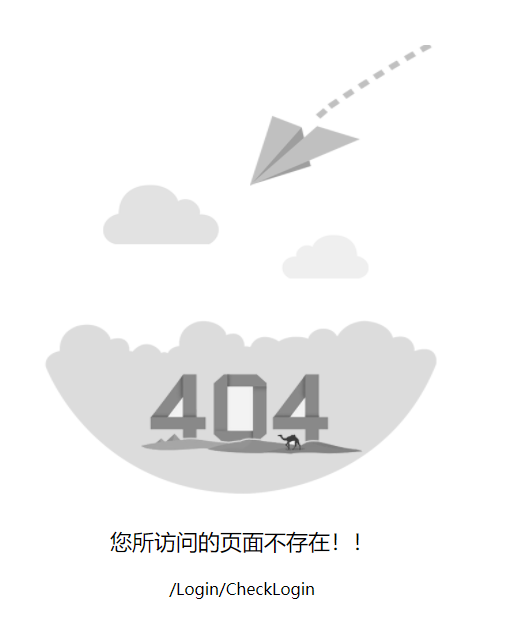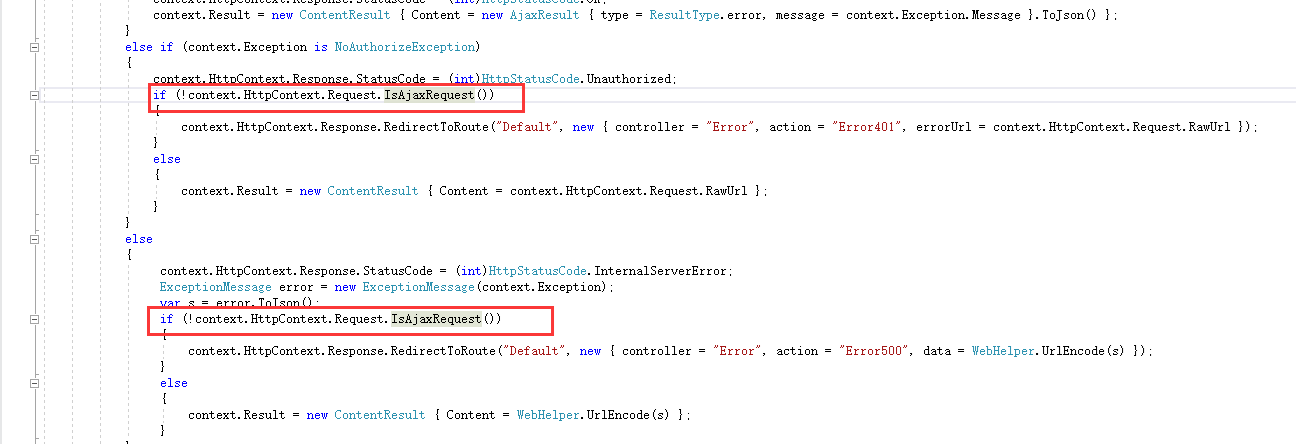一、前言
由于客户端的环境不一致,有可能会造成我们预计不到的异常错误,所以在项目中,友好的异常信息提示,是非常重要的。在asp.net mvc中实现异常属性拦截也非常简单,只需要继承另一个类(System.Web.Mvc.FilterAttribute)和一个接口(System.Web.Mvc.IExceptionFilter),实现接口里面OnException方法,或者直接继承Mvc 提供的类System.Web.Mvc.HandleErrorAttribute。
下面话不多说了,来一起看看详细的介绍吧
二、实现关键逻辑
继承System.Web.Mvc.HandleErrorAttribute,重写了OnException方法,主要实现逻辑代码如下:
|
1
2
3
4
5
6
7
8
9
10
11
12
13
14
15
16
17
18
19
20
21
22
23
24
25
26
27
28
29
30
31
32
33
34
35
36
37
38
39
40
41
42
43
44
45
46
47
48
49
50
51
52
53
54
55
56
57
58
59
60
61
62
63
64
65
66
|
public class HandlerErrorAttribute : HandleErrorAttribute{ /// <summary> /// 控制器方法中出现异常,会调用该方法捕获异常 /// </summary> /// <param name="context">提供使用</param> public override void OnException(ExceptionContext context) { WriteLog(context); base.OnException(context); context.ExceptionHandled = true; if (context.Exception is UserFriendlyException) { context.HttpContext.Response.StatusCode = (int)HttpStatusCode.OK; context.Result = new ContentResult { Content = new AjaxResult { type = ResultType.error, message = context.Exception.Message }.ToJson() }; } else if (context.Exception is NoAuthorizeException) { context.HttpContext.Response.StatusCode = (int)HttpStatusCode.Unauthorized; if (!context.HttpContext.Request.IsAjaxRequest()) { context.HttpContext.Response.RedirectToRoute("Default", new { controller = "Error", action = "Error401", errorUrl = context.HttpContext.Request.RawUrl }); } else { context.Result = new ContentResult { Content = context.HttpContext.Request.RawUrl }; } } else { context.HttpContext.Response.StatusCode = (int)HttpStatusCode.InternalServerError; ExceptionMessage error = new ExceptionMessage(context.Exception); var s = error.ToJson(); if (!context.HttpContext.Request.IsAjaxRequest()) { context.HttpContext.Response.RedirectToRoute("Default", new { controller = "Error", action = "Error500", data = WebHelper.UrlEncode(s) }); } else { context.Result = new ContentResult { Content = WebHelper.UrlEncode(s) }; } } } /// <summary> /// 写入日志(log4net) /// </summary> /// <param name="context">提供使用</param> private void WriteLog(ExceptionContext context) { if (context == null) return; if (context.Exception is NoAuthorizeException || context.Exception is UserFriendlyException) { //友好错误提示,未授权错误提示,记录警告日志 LogHelper.Warn(context.Exception.Message); } else { //异常错误, LogHelper.Error(context.Exception); ////TODO :写入错误日志到数据库 } }} |
MVC 过滤器全局注册异常拦截:
|
1
2
3
4
5
6
7
|
public class FilterConfig { public static void RegisterGlobalFilters(GlobalFilterCollection filters) { filters.Add(new HandlerErrorAttribute()); } } |
我们看到,context.Exception 分为3种:UserFriendlyException,NoAuthorizeException 或 Exception;UserFriendlyException 是指友好异常,前端友好提示错误信息。NoAuthorizeException 为401未授权异常,当页面未被授权访问时,返回该异常,并携带有未授权的路径地址。其他异常统一返回500错误,并携带异常信息。
三、异常处理
1.401 未授权错误
异常定义代码:
|
1
2
3
4
5
6
7
8
9
10
|
/// <summary>/// 没有被授权的异常/// </summary>public class NoAuthorizeException : Exception{ public NoAuthorizeException(string message) : base(message) { }} |
抛出异常代码:
|
1
|
throw new NoAuthorizeException("未授权"); |
前端UI效果:

2.404 未找到页面错误
MVC的404异常处理,有几种方式,我们采用了在Global.asax全局请求函数中处理, 请查看以下代码
|
1
2
3
4
5
6
7
8
9
10
11
12
13
14
15
16
|
protected void Application_EndRequest() { if (Context.Response.StatusCode == 404) { bool isAjax = new HttpRequestWrapper(Context.Request).IsAjaxRequest(); if (isAjax) { Response.Clear(); Response.Write(Context.Request.RawUrl); } else { Response.RedirectToRoute("Default", new { controller = "Error", action = "Error404", errorUrl = Context.Request.RawUrl }); } } } |
前端UI效果:

3.500服务器内部错误
500异常错误抛出的异常信息对象定义:
|
1
2
3
4
5
6
7
8
9
10
11
12
13
14
15
16
17
18
19
20
21
22
23
24
25
26
27
28
29
30
31
32
33
34
35
36
37
38
39
40
41
42
43
44
45
46
47
48
49
50
51
52
53
54
55
56
57
58
59
60
61
62
63
64
65
66
67
68
69
70
71
72
73
74
75
76
77
78
79
80
81
82
83
84
85
86
87
88
89
90
91
92
93
94
95
96
97
98
99
100
101
102
103
104
105
106
107
108
|
/// <summary>/// 异常错误信息/// </summary>[Serializable]public class ExceptionMessage{ public ExceptionMessage() { } /// <summary> /// 构造函数 /// 默认显示异常页面 /// </summary> /// <param name="ex">异常对象</param> public ExceptionMessage(Exception ex) :this(ex, true) { } /// <summary> /// 构造函数 /// </summary> /// <param name="ex">异常对象</param> /// <param name="isShowException">是否显示异常页面</param> public ExceptionMessage(Exception ex, bool isShowException) { MsgType = ex.GetType().Name; Message = ex.InnerException != null ? ex.InnerException.Message : ex.Message; StackTrace = ex.StackTrace.Length > 300 ? ex.StackTrace.Substring(0, 300) : ex.StackTrace; Source = ex.Source; Time = DateTime.Now.ToString("yyyy-MM-dd HH:mm:ss"); Assembly = ex.TargetSite.Module.Assembly.FullName; Method = ex.TargetSite.Name; ShowException = isShowException; var request = HttpContext.Current.Request; IP = Net.Ip; UserAgent = request.UserAgent; Path = request.Path; HttpMethod = request.HttpMethod; } /// <summary> /// 消息类型 /// </summary> public string MsgType { get; set; } /// <summary> /// 消息内容 /// </summary> public string Message { get; set; } /// <summary> /// 请求路径 /// </summary> public string Path { get; set; } /// <summary> /// 程序集名称 /// </summary> public string Assembly { get; set; } /// <summary> /// 异常参数 /// </summary> public string ActionArguments { get; set; } /// <summary> /// 请求类型 /// </summary> public string HttpMethod { get; set; } /// <summary> /// 异常堆栈 /// </summary> public string StackTrace { get; set; } /// <summary> /// 异常源 /// </summary> public string Source { get; set; } /// <summary> /// 服务器IP 端口 /// </summary> public string IP { get; set; } /// <summary> /// 客户端浏览器标识 /// </summary> public string UserAgent { get; set; } /// <summary> /// 是否显示异常界面 /// </summary> public bool ShowException { get; set; } /// <summary> /// 异常发生时间 /// </summary> public string Time { get; set; } /// <summary> /// 异常发生方法 /// </summary> public string Method { get; set; }} |
抛出异常代码:
|
1
|
throw new Exception("出错了"); |
前端UI效果:

4. UserFriendlyException 友好异常
异常定义代码:
|
1
2
3
4
5
6
7
8
9
10
|
/// <summary>/// 用户友好异常/// </summary>public class UserFriendlyException : Exception{ public UserFriendlyException(string message) : base(message) { }} |
在异常拦截关键代码中,我们发现友好异常(UserFriendlyException)其实是返回了一个结果对象AjaxResult,

AjaxResult对象的定义:
|
1
2
3
4
5
6
7
8
9
10
11
12
13
14
15
16
17
18
19
20
21
22
23
24
25
26
27
28
29
30
31
32
33
34
35
36
37
38
39
40
41
42
43
44
45
46
47
48
49
50
|
/// <summary> /// 表示Ajax操作结果 /// </summary> public class AjaxResult { /// <summary> /// 获取 Ajax操作结果类型 /// </summary> public ResultType type { get; set; } /// <summary> /// 获取 Ajax操作结果编码 /// </summary> public int errorcode { get; set; } /// <summary> /// 获取 消息内容 /// </summary> public string message { get; set; } /// <summary> /// 获取 返回数据 /// </summary> public object resultdata { get; set; } } /// <summary> /// 表示 ajax 操作结果类型的枚举 /// </summary> public enum ResultType { /// <summary> /// 消息结果类型 /// </summary> info = 0, /// <summary> /// 成功结果类型 /// </summary> success = 1, /// <summary> /// 警告结果类型 /// </summary> warning = 2, /// <summary> /// 异常结果类型 /// </summary> error = 3 } |
四、Ajax请求异常时处理
在异常拦截的关键代码中,我们有看到,如果是ajax请求时,是执行不同的逻辑,这是因为ajax的请求,不能直接通过MVC的路由跳转,在请求时必须返回结果内容

然后在前端ajax的方法中,统一处理返回的错误,以下是我们项目中用到的ajax封装,对异常错误,进行了统一处理。
|
1
2
3
4
5
6
7
8
9
10
11
12
13
14
15
16
17
18
19
20
21
22
23
24
25
26
27
28
29
30
31
32
33
34
35
36
37
38
39
40
41
42
43
44
45
46
47
48
49
50
51
52
53
54
55
56
57
58
59
60
61
62
63
64
65
66
67
68
69
70
71
72
73
74
75
76
77
78
79
80
81
82
83
84
85
86
87
88
89
90
91
92
93
94
95
96
97
98
99
100
101
102
103
104
105
106
107
108
109
110
111
112
113
114
115
116
117
118
119
120
121
122
123
124
125
126
127
128
129
130
131
132
133
134
135
136
137
138
139
140
141
142
143
144
145
146
147
148
149
|
(function ($) { "use strict"; $.httpCode = { success: "1", fail: "3", }; // http 通信异常的时候调用此方法 $.httpErrorLog = function (msg) { console.log('=====>' + new Date().getTime() + '<====='); console.log(msg); }; // ajax请求错误处理 $.httpError = function (xhr, textStatus, errorThrown) { if (xhr.status == 401) { location.href = "/Error/Error401?errorUrl=" + xhr.responseText; } if (xhr.status == 404) { location.href = "/Error/Error404?errorUrl=" + xhr.responseText; } if (xhr.status == 500) { location.href = "/Error/Error500?data=" + xhr.responseText; } }; /* get请求方法(异步): * url地址, param参数, callback回调函数 beforeSend 请求之前回调函数, complete 请求完成之后回调函数 * 考虑到get请求一般将参数与url拼接一起传递,所以将param参数放置最后 * 返回AjaxResult结果对象 */ $.httpAsyncGet = function (url, callback, beforeSend, complete, param) { $.ajax({ url: url, data: param, type: "GET", dataType: "json", async: true, cache: false, success: function (data) { if ($.isFunction(callback)) callback(data); }, error: function (XMLHttpRequest, textStatus, errorThrown) { $.httpError(XMLHttpRequest, textStatus, errorThrown); }, beforeSend: function () { if (!!beforeSend) beforeSend(); }, complete: function () { if (!!complete) complete(); } }); }; /* get请求方法(同步): * url地址,param参数 * 返回实体数据对象 */ $.httpGet = function (url, param) { var res = {}; $.ajax({ url: url, data: param, type: "GET", dataType: "json", async: false, cache: false, success: function (data) { res = data; }, error: function (XMLHttpRequest, textStatus, errorThrown) { $.httpError(XMLHttpRequest, textStatus, errorThrown); }, }); return res; }; /* post请求方法(异步): * url地址, param参数, callback回调函数 beforeSend 请求之前回调函数, complete 请求完成之后回调函数 * 返回AjaxResult结果对象 */ $.httpAsyncPost = function (url, param, callback, beforeSend, complete) { $.ajax({ url: url, data: param, type: "POST", dataType: "json", async: true, cache: false, success: function (data) { if ($.isFunction(callback)) callback(data); }, error: function (XMLHttpRequest, textStatus, errorThrown) { $.httpError(XMLHttpRequest, textStatus, errorThrown); }, beforeSend: function () { if (!!beforeSend) beforeSend(); }, complete: function () { if (!!complete) complete(); } }); }; /* post请求方法(同步): * url地址,param参数, callback回调函数 * 返回实体数据对象 */ $.httpPost = function (url, param, callback) { $.ajax({ url: url, data: param, type: "POST", dataType: "json", async: false, cache: false, success: function (data) { if ($.isFunction(callback)) callback(data); }, error: function (XMLHttpRequest, textStatus, errorThrown) { $.httpError(XMLHttpRequest, textStatus, errorThrown); }, }); }, /* ajax异步封装: * type 请求类型, url地址, param参数, callback回调函数 * 返回实体数据对象 */ $.httpAsync = function (type, url, param, callback) { $.ajax({ url: url, data: param, type: type, dataType: "json", async: true, cache: false, success: function (data) { if ($.isFunction(callback)) callback(data); }, error: function (XMLHttpRequest, textStatus, errorThrown) { $.httpError(XMLHttpRequest, textStatus, errorThrown); }, }); };})(jQuery); |
五、总结
至此,我们发现其实MVC的异常处理,真的很简单,只需要在过滤器中全局注册之后,然后重写OnException的方法,实现逻辑即可。关键是在于项目中Ajax请求,需要用统一的封装方法。
好了,以上就是这篇文章的全部内容了,希望本文的内容对大家的学习或者工作具有一定的参考学习价值,如果有疑问大家可以留言交流,谢谢大家对服务器之家的支持。
原文链接:https://www.cnblogs.com/xyb0226/p/9250334.html














